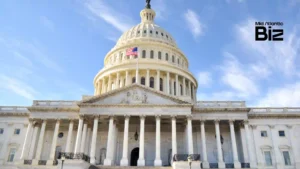
On November 27, 2024, President Joe Biden announced a cease-fire agreement between Israel and Hezbollah, brokered by the United States and France. This pivotal development is expected to bring temporary stability to a region that has long been a hotspot for geopolitical tensions and energy market disruptions. While the cease-fire aims to address immediate humanitarian concerns and reduce violence, its impact on global oil prices and U.S. energy markets is a key area of interest for businesses and policymakers.
This article explores the potential ramifications of this agreement on oil prices, energy security, and U.S. energy markets, offering insights into what lies ahead for one of the world’s most volatile industries.
The Middle East’s Role in Global Energy Markets
The Middle East is a cornerstone of the global energy market, home to some of the world’s largest oil reserves and producers, including Saudi Arabia, Iraq, and Iran. The region’s geopolitical instability often causes fluctuations in oil prices, with conflicts and blockades leading to supply disruptions and price spikes.
The recent conflict between Israel and Hezbollah escalated fears of broader instability in the region, threatening key shipping routes like the Strait of Hormuz and major oil export hubs. As tensions flared, oil prices saw an uptick, driven by concerns over potential supply shortages. The cease-fire agreement temporarily alleviates these fears, providing a window of stability for the markets.
Immediate Effects of the Cease-Fire on Oil Prices
The announcement of the cease-fire has already had a calming effect on oil markets, with prices showing signs of stabilization. The following factors contribute to this trend:
- Reduction in Supply Disruption Risks: The cease-fire diminishes the immediate threat to key oil-producing regions and shipping routes, reducing the risk premium that often inflates oil prices during conflicts.
- Market Confidence: Stability in the Middle East reassures investors, encouraging more predictable market behavior and reducing speculative trading that can exacerbate price volatility.
- OPEC Dynamics: With major oil-producing nations in the Middle East likely to maintain production levels, the cease-fire may discourage sudden shifts in output that could destabilize markets.
However, it is important to note that oil prices remain influenced by a host of factors beyond the cease-fire, including global demand, production decisions by OPEC+, and economic conditions in major economies like the U.S. and China.
Long-Term Implications for U.S. Energy Markets
1. Oil Imports and Energy Security
The United States, while increasingly self-reliant due to its shale revolution, still imports significant amounts of crude oil. Stability in the Middle East ensures the uninterrupted flow of oil to global markets, indirectly benefiting the U.S. by maintaining global supply levels and moderating prices.
A prolonged cease-fire could lead to more predictable energy markets, reducing the need for emergency measures like tapping into the Strategic Petroleum Reserve (SPR), which the U.S. has done in response to past price surges.
2. Impact on Domestic Oil Producers
Stability in the Middle East and lower oil prices may present challenges for U.S. shale producers, who typically face higher production costs compared to their Middle Eastern counterparts. If prices stabilize at lower levels, U.S. producers may experience tighter profit margins, potentially slowing down new drilling projects and investment in production capacity.
On the flip side, the cease-fire could boost long-term investor confidence in the energy sector by reducing the risk of severe price shocks. This could encourage capital inflows into U.S. energy companies, particularly those focused on innovative extraction methods and renewable energy transitions.
3. Renewable Energy and Transition Efforts
The stability brought by the cease-fire may provide a buffer for policymakers and businesses to accelerate renewable energy initiatives. With less immediate pressure from oil price volatility, the U.S. can focus on long-term energy security strategies, such as increasing investments in wind, solar, and electric vehicle (EV) infrastructure.
The cease-fire could also influence geopolitical dynamics around energy transitions, with Middle Eastern countries potentially seeking to diversify their economies away from oil dependence, aligning with global trends toward sustainability.
Risks and Uncertainties
While the cease-fire is a positive development, its sustainability remains uncertain. Several factors could disrupt the fragile stability, including:
- Resurgence of Hostilities: Cease-fires in the Middle East often face challenges, with the potential for renewed violence casting a shadow over long-term stability.
- Broader Regional Instabilities: Other conflicts in the region, such as tensions involving Iran or ongoing instability in Syria and Yemen, could still impact energy markets.
- Geopolitical Maneuvering: Major powers like Russia and China may seek to exploit the cease-fire for their strategic interests in the region, potentially complicating U.S. energy security strategies.
These risks underscore the complexity of achieving sustained stability in the Middle East and its implications for global energy markets.
Strategic Opportunities for U.S. Businesses
For U.S. businesses, the cease-fire opens up several strategic opportunities:
- Energy Companies: With stabilized oil prices, energy firms can focus on optimizing operations and exploring new markets without the immediate pressures of price volatility.
- Renewable Energy Sector: The reduced geopolitical risk provides a conducive environment for renewable energy projects, allowing businesses to leverage government incentives and private investments.
- Logistics and Transportation: Stable energy prices can benefit logistics and transportation companies, reducing fuel costs and enabling more predictable financial planning.
- Manufacturing: Lower energy costs can support manufacturing operations, particularly those reliant on energy-intensive processes, improving competitiveness.
The Broader Geopolitical Picture
The cease-fire between Israel and Hezbollah is not just a regional development but a reflection of broader geopolitical dynamics. The involvement of France in brokering the agreement highlights the increasing role of European powers in Middle Eastern diplomacy. For the U.S., the cease-fire represents an opportunity to reinforce its influence in the region, particularly as it faces competition from China and Russia for geopolitical clout.
The Middle East’s role as a critical energy supplier and strategic partner ensures that U.S. engagement in the region will remain a priority. Balancing immediate energy needs with long-term geopolitical and economic strategies will be essential for sustaining U.S. leadership in global markets.
Conclusion
The Middle East cease-fire is a welcome respite for energy markets, offering short-term stability and a potential reduction in oil price volatility. For the U.S., this agreement provides an opportunity to recalibrate its energy policies, strengthen its energy security, and advance its renewable energy agenda. However, the durability of this stability depends on addressing the root causes of conflict in the region and maintaining a proactive approach to managing geopolitical risks.
As businesses and policymakers navigate this complex landscape, the cease-fire serves as a reminder of the intricate link between geopolitics and energy markets. By leveraging the opportunities presented by this development, the U.S. can position itself for a more resilient and sustainable energy future.
Article By : Mid Atlantic Biz












